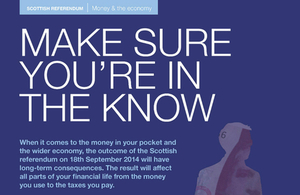United means shared economic success
Latest UK Government Scottish referendum information pack highlights strengths of a united economy.

With fewer than 200 days to go until the Scottish referendum, the UK Government has produced the latest edition in a series of information packs - focussing on money and the economy in the context of the independence debate.
Danny Alexander, Chief Secretary to the Treasury, said:
As part of the UK the Scottish economy is growing, inflation is down and more people are in work. By remaining part of the UK, Scottish industry and jobs will be protected by the generous freeze on duties on spirits and the £3bn tax break for oil and gas industries we announced at the Budget, as well as the big cuts in income tax helping 2 million Scottish workers.
This new pack sets out some key facts people in Scotland need to know before the referendum in September. I urge everyone to read up on the facts and understand the true benefits being part of the United Kingdom brings to Scotland.
The UK Government Money & Economy pack highlights the following key facts, demonstrating that a United Kingdom makes for a stronger economy benefitting us all:
-
United means shared economic success. Following the financial crisis both the UK and Scottish economies are growing again and employment is at its highest ever level.
-
United means we benefit from a single, domestic market, and a truly borderless economy. This means people and businesses in Scotland can buy and sell goods and services freely with the rest of the UK. Creating a border would reduce trade and cost jobs.
-
United means we pool resources and share risks, which helps us prosper. Being part of the UK’s broader tax base means the peaks and troughs in oil and gas receipts are evened out so public spending remains stable.
-
United means our finances are more secure. During the financial crisis, the banking system received extraordinary support, which was only possible due to the scale of the UK. If Scotland were an independent country, its banking sector would over 12 times the size of its economy. Not even the Icelandic, Irish or Cypriot banking sectors were that big at the height of the financial crisis.
-
Going it alone could be costly: The National Institute of Economic and Social Research has assessed that Scottish interest rates could be up to 1.7% higher than the continuing UK, which could cost homeowners in Scotland an extra £1,700 to an annual mortgage payment.
-
Spending matters: Last year Scotland received around £1,300 more public spending per person than the UK average.
For more information and to access the material go to: www.gov.uk/scottishreferendum
The Money & Economy Pack is the second in a series of packs highlighting the benefits of Scotland remaining in the UK. The aim is to provide voters with clear and accurate information to help them make an informed decision ahead of the Scottish independence referendum in September 2014.
The material comes in a factsheet-style format and complements the more detailed Scotland Analysis series, which contains in-depth analysis of the benefits of a United Kingdom.